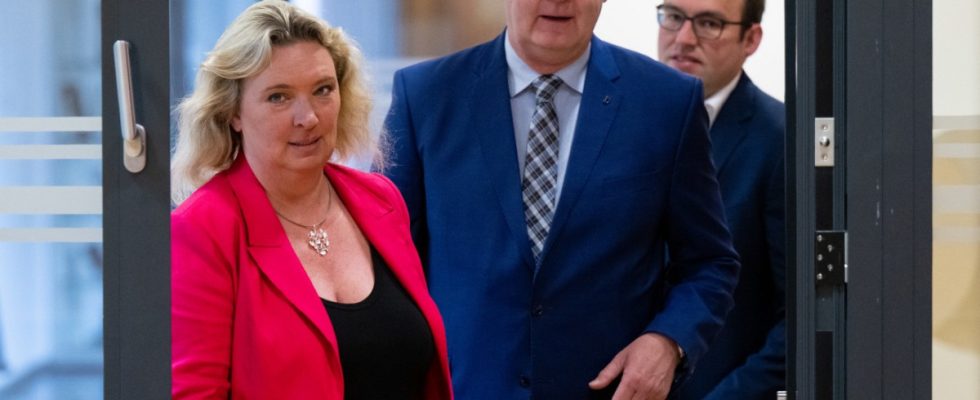Maximum pressure, pressure at all levels, pressure, pressure, pressure – you can hardly count how often Kerstin Schreyer uses the word on Wednesday. The former Bavarian Minister of Transport makes serious allegations in the investigative committee on the second Munich S-Bahn trunk line of Deutsche Bahn. Figures should be back in 2020, for the looming construction delay and cost explosion. Experts from the Free State had already calculated what could be threatening there, and their “gut feeling” after taking office in February was also in the direction. Schreyer has her constituency in the district of Munich, “we are suffocating in traffic”. But on the part of the railway? It was constantly “bricked up”, one had “hit a wall everywhere”. The problem: “I can’t govern a Deutsche Bahn as Bavarian Minister of Transport.”
At the end of September, Schreyer finally found out from the railways about massive problems with the largest infrastructure project in the Free State, at the working level. And now? The minister’s admonitions, requests and demands – this is the impression created by Schreyer’s statement – continued. Internal this time. In the meantime, Schreyer had informed the State Chancellery and reported to the cabinet. There she was told: she should contact Federal Transport Minister Andreas Scheuer (CSU). And Prime Minister Markus Söder (CSU) will set up a round table, a top-level discussion with the railways, the federal government and the Free State. Scheuer had Schreyer rebuffed after a phone call and a letter, as she says – she should please contact Bahnvorstand Ronald Pofalla.
And the round table? Söder’s state chancellery was apparently in no hurry. “It was always said: still coming,” reports Schreyer. She believed in it until the end of her term in February 2022. She has repeatedly sent “warning signals” about the project so that “the fact that the hut is on fire” is not misunderstood. And a concept presented by the minister for a large package of measures to bring local transport in the greater Munich area into shape would have required a fundamental decision. It would have been several hundred million euros a year. “Only the prime minister can give this decision with a go,” says Schreyer. That never happened either.
It is the 17th meeting of the U-Committee, which is to examine how the disaster around the main route came about. Instead of the 3.8 billion euros originally estimated, almost double the total costs are now expected for the mammoth project. And the completion is expected to last until 2037, originally 2028 was planned. However, these numbers only came out publicly at the end of September 2022 – they triggered a tremor and also the clarification committee in the state parliament. The opposition accuses the state government of having done something about the impending fiasco too late and having informed the state parliament and the public too late. A guess: Söder wanted to keep the unwelcome topic out of the 2021 federal election campaign, also so as not to jeopardize any chancellor ambitions. As an SZ research showed, at the end of 2020, a department of the State Chancellery advised in an internal note to “dilatory”, i.e. postponement, treatment of the cause. This is “not a winning topic in the election campaign”. Schreyer says she didn’t even know the word “dilatory” before the media report.
“We did what we could,” is her conclusion in the almost five-hour statement in the U-Committee. She means herself and her people in the Ministry. Schreyer describes her urging at Deutsche Bahn for information and a rattle (“handling mediocre”) with Pofalla at an event in Nuremberg after the numbers became known at the working level. Pofalla declared this in a letter to be “irrelevant” again a little later. For them, the railway acts like a “black box”, unwilling to account to a client like the Free State.
According to her report in the cabinet, says Schreyer, she had “the promise from Söder that we’ll get a round table” – with everyone involved to find solutions. At the invitation of the prime minister, of course. Because if only she, as a minister, “had invited, no one would have come.” Later she checked several times, at all levels, with letters and SMS directly to Söder – but eventually gave up. “If there is no answer, then so be it.” You are not entitled to an assessment of this.
The Greens file a criminal complaint against Andreas Scheuer – on suspicion of lying
However, Schreyer does not want to let it stand that its committee chairman Bernhard Pohl (free voters) attested to a “plead” after the round table. She asked for help in the State Chancellery and was met there “not only with reciprocity”. In 2022 she lost the post of minister in a cabinet reshuffle. Did that have something to do with the role as a pain in the neck for the trunk line? Markus Büchler (Greens) wants to know that. Schreyer says that a Prime Minister has the right to shape his cabinet according to his own wishes. Söder said to her personally that she “didn’t make any mistakes”. Otherwise, even the opposition certifies that Schreyer is doing a good job. You addressed the problems and sounded the alarm, praises Sebastian Körber (FDP). Inge Aures from the SPD pays Schreyer “respect” for her backbone – “it’s just tragic that the prime minister didn’t do anything with it.”
And there was another reaction this Wednesday: The Greens announced that they had filed a criminal complaint against Andreas Scheuer on suspicion of false unsworn testimony. In his testimony in the U-Committee, Scheuer stated that he did not receive the letter from Schreyer in October 2020. To which they very well want to have received an answer. Today’s Federal Minister of Transport, Volker Wissing (FDP), also questioned Scheuer’s version in the committee. Green politician Büchler says: “If Andreas Scheuer knowingly told an untruth, there must be consequences. This is about billions in sunk tax money.”

